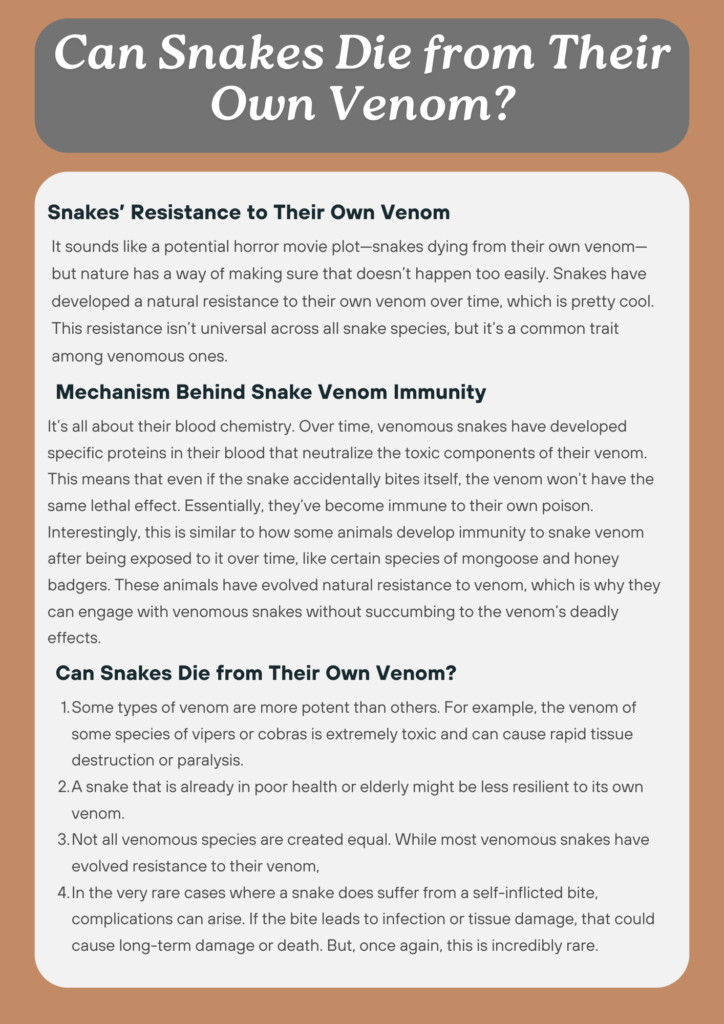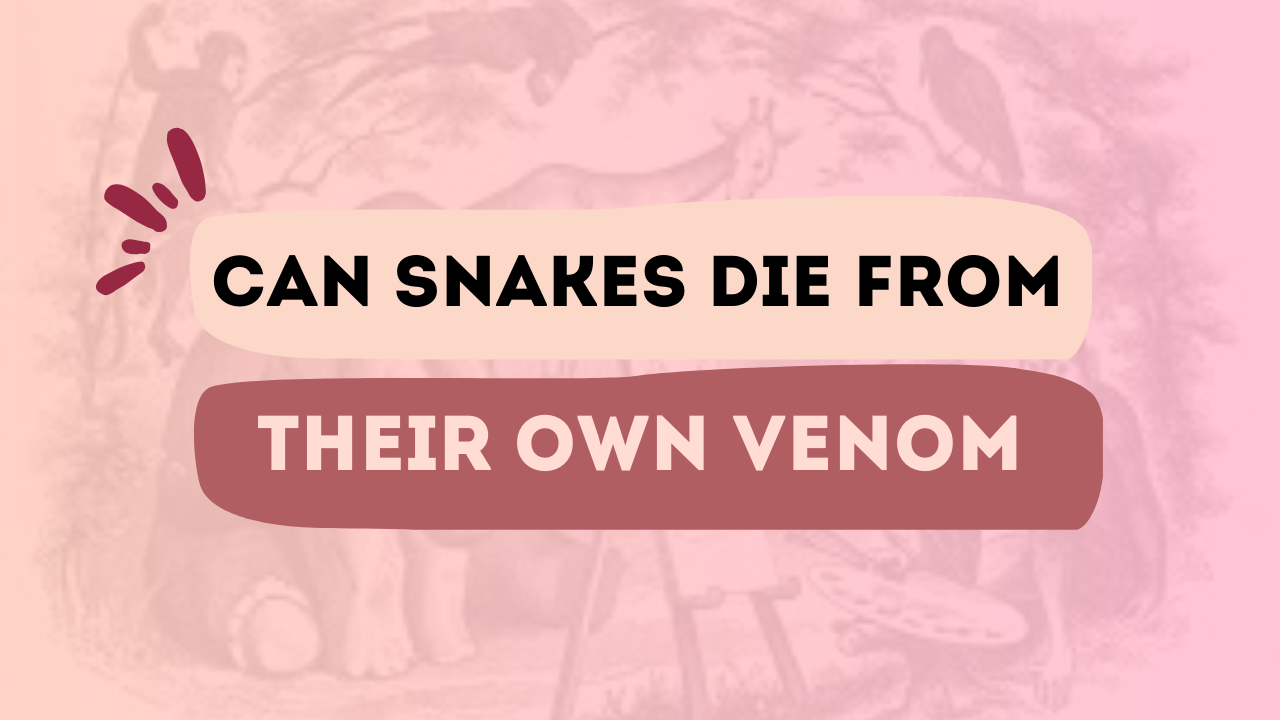Have you ever wondered if snakes could actually die from their own venom? I mean, it’s a good question, right? After all, these creatures produce some of the most potent toxins in the animal kingdom, so it stands to reason that they could, in theory, fall victim to their own lethal concoction. Well, it’s not as simple as it might seem. Snakes have evolved some pretty nifty ways of keeping themselves safe from the venom they produce, but of course, there are exceptions. It’s an interesting and, dare I say, a little bit of a freaky topic to dive into. So, let’s explore this venomous mystery together!
What Is Snake Venom?
Before we dive deeper into whether snakes can die from their own venom, let’s talk about venom itself. Snake venom is a highly complex cocktail of enzymes, proteins, and other molecules that help them immobilize, digest, and break down their prey. It’s evolved over millions of years, making snakes some of the most effective hunters in the world. The venom works quickly to paralyze or kill their prey, which makes it easier for the snake to swallow it whole.
There are different types of venom that snakes use, and they’re typically categorized into three main groups: hemotoxins, neurotoxins, and cytotoxins. Hemotoxins target the blood, neurotoxins affect the nervous system, and cytotoxins destroy cells and tissues. Each type of venom has its own set of effects, depending on the species of snake. So, it’s not just a matter of “poisonous” or “non-poisonous.” There’s a whole world of complexity going on behind the scenes.
Snakes’ Resistance to Their Own Venom
It sounds like a potential horror movie plot—snakes dying from their own venom—but nature has a way of making sure that doesn’t happen too easily. Snakes have developed a natural resistance to their own venom over time, which is pretty cool. This resistance isn’t universal across all snake species, but it’s a common trait among venomous ones.
The reason for this is simple: survival. If a snake were susceptible to its own venom, it would be incredibly vulnerable to accidental self-injection while feeding or defending itself. Imagine a snake getting a little too excited during a meal and accidentally biting itself—if it didn’t have a resistance to the venom, that could be the end of the story.
The Mechanism Behind Snake Venom Immunity
So how exactly do snakes resist their own venom? It’s all about their blood chemistry. Over time, venomous snakes have developed specific proteins in their blood that neutralize the toxic components of their venom. This means that even if the snake accidentally bites itself, the venom won’t have the same lethal effect. Essentially, they’ve become immune to their own poison.
Interestingly, this is similar to how some animals develop immunity to snake venom after being exposed to it over time, like certain species of mongoose and honey badgers. These animals have evolved natural resistance to venom, which is why they can engage with venomous snakes without succumbing to the venom’s deadly effects. However, the mechanism in snakes is even more specialized, making them pretty much invulnerable to their own toxic secretions.
Can Snakes Die from Their Own Venom?
Now, to answer the burning question: Can snakes die from their own venom? In most cases, the answer is no. The snake’s resistance to its venom is a powerful safeguard. However, there are exceptions to this rule. Accidental self-envenomation—when a snake accidentally injects itself with venom—could potentially cause harm, but this is pretty rare.
There are a few factors that might influence whether a snake could succumb to its own venom:
- Type of Venom: Some types of venom are more potent than others. For example, the venom of some species of vipers or cobras is extremely toxic and can cause rapid tissue destruction or paralysis. If a snake were to inject a large amount of venom into a highly sensitive area (like its own face or a part of its body where it can’t resist the venom), it could be fatal in rare circumstances.
- Health and Age of the Snake: A snake that is already in poor health or elderly might be less resilient to its own venom. In these cases, an accidental bite could prove fatal, but again, this is highly uncommon.
- Mistakes During Hunting: Sometimes, a snake might bite itself in the process of subduing prey. In some very rare cases, if a snake doesn’t retreat quickly or accidentally bites itself multiple times, it might get a large enough dose of venom that it can’t handle it.
- Venomous Species: Not all venomous species are created equal. While most venomous snakes have evolved resistance to their venom, there are some species where this immunity may not be as strong or effective, making them more vulnerable to their own toxins.
- Infection and Complications: In the very rare cases where a snake does suffer from a self-inflicted bite, complications can arise. If the bite leads to infection or tissue damage, that could cause long-term damage or death. But, once again, this is incredibly rare.

Accidental Bites: A Snake’s Worst Nightmare?
While snakes are generally well-equipped to avoid harming themselves with their venom, accidents do happen. It’s unlikely, but possible, that a snake could bite itself in a situation where it can’t effectively neutralize the venom in time. However, in the grand scheme of things, such events are few and far between. After all, snakes have been around for millions of years, and they’ve had plenty of time to perfect their venom-handling strategies.
For most snakes, the threat of dying from their own venom isn’t something they need to worry about. They’ve evolved in a way that makes them incredibly resilient, and their venom is a tool they control with remarkable precision. As much as we like to imagine that even the deadliest creatures are vulnerable to their own powers, nature usually has a way of preventing that.
Final Thoughts: A Bittersweet Truth
So, can snakes die from their own venom? Most of the time, no. Their bodies are designed to handle their own toxins, but accidents or unusual circumstances could lead to self-envenomation. However, these cases are incredibly rare. Snakes have evolved to be masters of their venom, making them lethal hunters but, luckily for them, almost invulnerable to their own deadly concoctions.
In the end, it’s just one of the fascinating mysteries of the natural world. Snakes have plenty of reasons to be feared, but dying from their own venom isn’t one of them—unless they really, really mess up.

